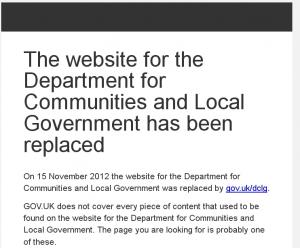



The familiar Communiites and Local Government website has now been replaced by the developing single portal for government, GOV.UK. DCLG and the Department for Transport are the first two departments to make the switch, on 15th November 2012.
In the process, access to information has become very different and in some cases harder. For example, a link to a July 2012 letter about council tax and New Homes Bonus - part of a current policy initiative, which we reported recently - generated the screen pictured at the top of this story which includes the text:
"Gov.uk does not cover every piece of information that used to be found on the website of the Deparrtment of Communities and Local Government. The page you are looking for is probably one of these"
However, the page containing this message did also include a link to a copy of the relevant page on the National Archives website.
Moreover, further investigation disclosed that the letter in question could be found on the new GOV.UK website using the search facilities. A search for "council tax information letters" brought up 150 results (including for example "car tax (vehicle licence)" under the "General" tab). The search seems to produce results for matches with any of the words in the search which is likely to generate more and more unpredictable results as the number of departments grows. Placing the search string in quotation marks did not seem to make any difference (though this was a problem with the previous site too).
Fortunately, there does seem to be some kind of relevance matching. So the link to "Council Tax lInformation Letters" did appear at the top of a list under the "Detailed Guidance" tab, even though the search results also contain irrelevant results further down such as "Agricultural vehicle licences and fuel.
There is a strong impression that results are limited to the first 50 under each of the three category tabs - 150 in total. All the searches tried brought up 150 results in this way bar one, which brought up 149. There is no Advanced Search or option to show more results and no way to filter by type of result eg publication or news story.
The series of Council Tax Information Letters on the new site goes back to 2010, whereas on the previous site the letters went back to 2006 (six years instead of three years, with a further link to the national archive). Disappointingly, there is no link from the new website back to the archived content if you are looking for earlier information. And although the National Archives site retains the structure of the CLG website at the point when it was superceded by GOV.UK, the search function no longer works on it, so you need to know where the content you were looking for on the old website is, or locate it using Google search.
Conversion of the data seems also to have been hurried - Informatoin letter 1/2012 appears under 2011 not 2012.
Searching for "empty homes" also produced some interesting results. Under the General tab there were 49 results including such exotic topics as "Hemp growing licence": but nothing of relevance to empty homes. Under the Detailed Guidance tab the 50 results start with "Park homes: guidance" before moving onto topics such as "Meat production and hygiene" and "Weed control for famers" (presumably only relevant to those who have a hemp growing licence?). Near the bottom of the list can be found the topic "Dwelling stock data" which does have some relevance to empty homes. Only under the Inside government tab are the results clearly about empty homes. Some of these results, such as publications on EDMOs for property owners, would have been better placed under the Detailed Guidance tab.
Searching for "Empty Dwelling Management Order" brings up "Trees and Woodland: management and conservation" as the top result under Detailed Guidance although again the Inside Government tab does bring up the relevant results.
There doesn't seem to be a strong challenge here to our own Information Library or to google, though the search process is certainly fast.
